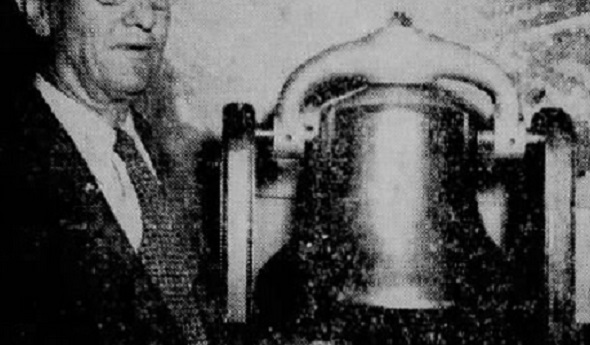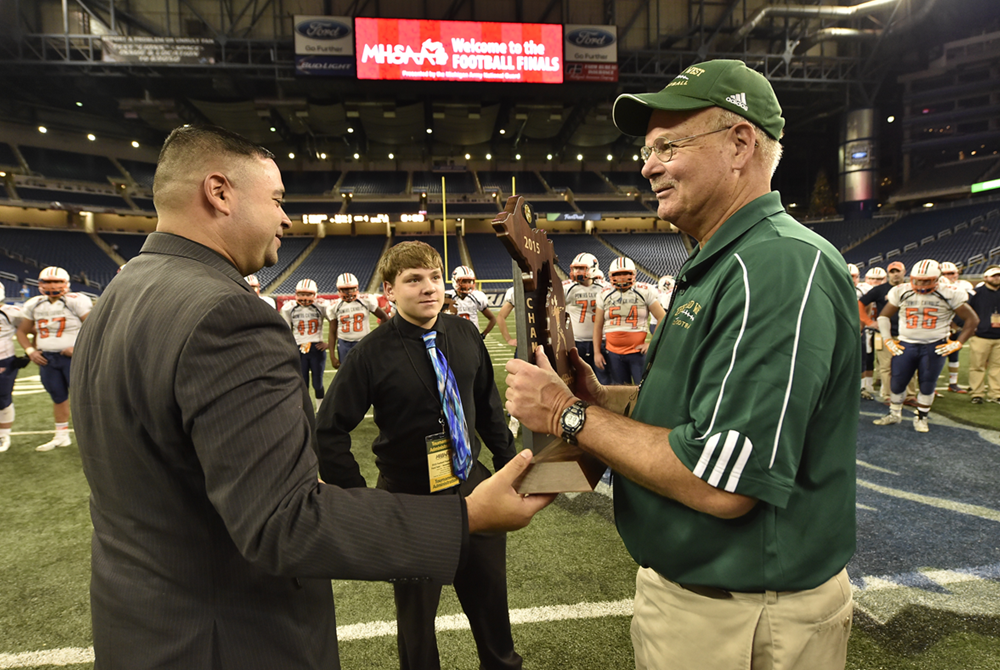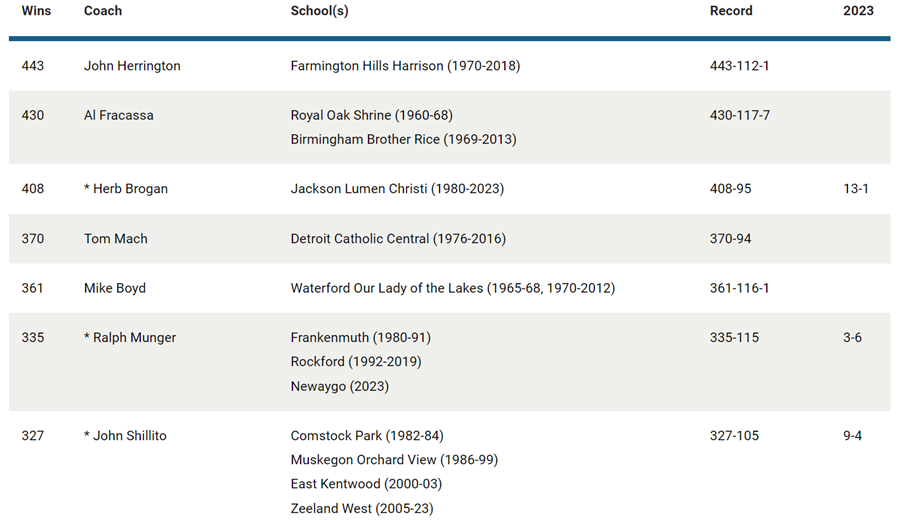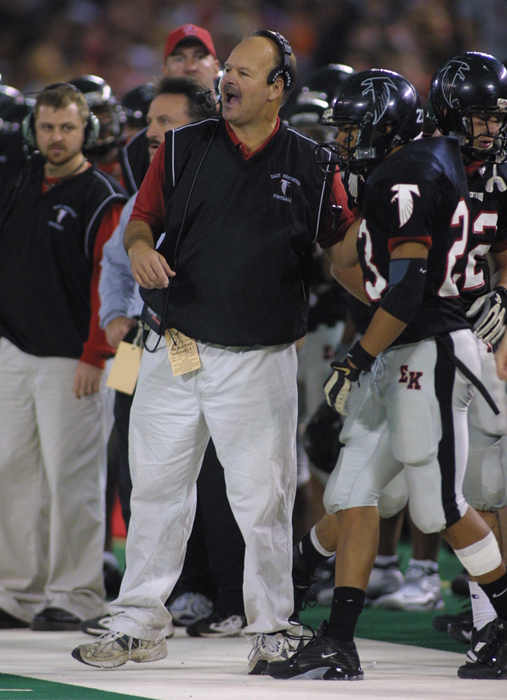
#TBT: Searching for The Hinker Bell
September 28, 2017
By Geoff Kimmerly
Second Half editor
Menominee will host Escanaba on Friday in the 121st meeting between two of the Upper Peninsula’s largest high schools and proudest football programs – but with the trophy celebrating the game still missing after it first disappeared more than half a century ago.
The two teams from 1948-1962 played for the The Hinker Bell, a locomotive bell that hasn’t been seen since 1963.
A decade ago, Escanaba Daily Press sports editor (and now Second Half correspondent) Denny Grall wrote about a newfound search for The Hinker Bell. But the mystery continues, and Grall’s story below tells of many of the twists and turns that to that point that had come in trying to locate it.
ESCANABA — Another search is underway to find the Hinker Bell.
The former locomotive bell went to the winner of the Escanaba-Menominee football game for about 15 years but has been missing for more than 40 years. It came from a locomotive owned by the Bay de Noquet Company and used on the LS&I Railroad that operated in Delta and Menominee counties.
The locomotive was built in 1906 by Baldwin Locomotive Works in Philadelphia and the bell was believed to have been cast in the railroad foundry, according to a 1953 newspaper clipping.
In 1948, one of the locomotive owners presented the bell to his friend, John Hinker of Menominee, an ardent sports fan who donated materials for the press box at Menominee’s Walton Blesch Field.
 Hinker gave the bell to then Menominee coach Mickey McCormick and indicated proper use for the bell would be as an award for the gridiron rivalry.
Hinker gave the bell to then Menominee coach Mickey McCormick and indicated proper use for the bell would be as an award for the gridiron rivalry.
Now Hinker’s great great nephew is trying to find the bell, which has not been seen since Escanaba’s current high school opened in 1963.
Tim Waters of Land O’ Lakes, Wis., who has launched the search, became interested by researching his family tree. “It is a big trophy (between 80 and 150 pounds by various estimates) and it is odd that it is missing,” Waters said in a recent telephone chat.
“One theory is that it is in somebody’s hunting camp or a home and they are using it as their own trophy,” said Waters.
“We have a pretty good investigation going on and all help is appreciated. If somebody does have it, we’re not looking to prosecute them. We’re just looking to get the darn thing back. Nobody will be in trouble.”
Waters refuted the old idea the bell was melted down. He has contacted numerous bell collectors, and they said a junk yard would have known it was worth a lot more than melted metal.
“The bell was not destroyed. We’ve come to that conclusion,” he said. “It was not put in a scrap yard.”
Waters contacted Coplan Iron and Metal of Escanaba and learned that bells were not melted or crushed and said the firm never accepted a bell with engravings matching the Hinker Bell.
Waters learned those businesses would sell them for the weight value to people who wanted them for yard ornaments/dinner bells, or to collectors.
“It is a treasure and it needs to be found,” said Waters.
Waters said the last known photo of the bell was with then EHS football coach Al Sigman and Esky players John Fisher and Phil Davidson in 1960. Escanaba beat Menominee from 1959-63 but could not find the bell in 1964 when the Maroons won. No one he has talked to remembers seeing the bell present at the first three games during the tenure of coach Jerry Cvengros.
The current Escanaba High School opened in 1963 and Bay de Noc Community College then occupied the old facility, which has since been demolished.
“Records indicate there was no report (of a missing bell) filed by Escanaba school district to the police department,” Waters said.
“The Hinker Bell is part of U.P. Michigan’s history, as is football and the railroads,” Waters said. “The people of Escanaba and Menominee deserve to have this trophy returned to their high schools.”
Waters, who has never seen an Escanaba or Menominee football game but is planning to rectify that omission this season, is hoping students at the two schools will join in the treasure hunt and talk about it with their parents and grandparents.
He has already contacted EHS athletic director Rob Ryan, who plans to thoroughly search the school basement.
He would like to find a photo of the bell to help collectors in their search. “Each bell was for a special locomotive,” said Waters.
“If they have a good picture we can pass it around and say we are looking for this bell. If they can pinpoint what this bell was on, they can help get the word out.”
He has also extended the search to the website at upfootball.com, which has generated interest but no bell. “If the bell is in the area still today, I don’t think it will take long to surface,” he said.
“If we don’t find this bell, we are going to try to make up a replacement as close as possible if the two schools are interested in that,” he said.
Waters is hoping that real estate agents, postal workers, delivery personnel, construction workers, etc., may have seen the bell during their travels and can help retrieve it.

Process, Relationships Still Matter Most as 4-Time Champ Shillito Coaches 41st Season
By
Steve Vedder
Special for MHSAA.com
October 18, 2024
It was John Shillito's third year as Muskegon Orchard View football coach, and while the wolves weren't exactly knocking at the door, some faint low growls could clearly be heard.
Shillito had been successful at Comstock Park with his teams going 21-8 over three seasons, but the move to Orchard View included 3-6 and 4-5 records the first two.
While there wasn't yet widespread anxiety, Shillito recalls there was a bit of concern.
"I was much younger then and wasn't as successful yet in education," Shillito said. "But we weathered it and came through the other side. But you wonder a little; there's always a little self-doubt. I think it was important to go through it, because you can learn as much even when you're not winning."
Michigan high school football is the better for Shillito sticking it out. Two schools later, Shillito finds himself as the state's third winningest active coach and seventh overall with a 333-106 mark over 41 seasons.
His Zeeland West team is 6-1 this season and likely to become his 27th team – and 15th in a row – to qualify for the playoffs. Shillito's teams at Byron Center, Muskegon Orchard View, East Kentwood and Zeeland West have won a combined 16 conference titles.
Not bad for someone whose first love was baseball. Shillito's father, Harry, played three seasons professionally in the Brooklyn Dodgers system during the "Boys of Summer" era of the 1940s and 50s. Shillito grew up as a talented catcher in the spring and top football prospect as a defensive lineman in football. When programs such as Central Michigan, Eastern Michigan and Northern Michigan began showing an interest, the lure of a football scholarship made it an easy decision which sport he would follow.
After playing three years at Central Michigan, his coaching career kicked off with an assistant gig at Central Bucks East in Pennsylvania in 1980. He became head coach at Comstock Park in 1982.
 Shillito said the same motivation which drove him into coaching has kept him in the sport for nearly five decades. It's not necessarily winning state championships – he’s won four at Zeeland West – or fulfilling a deep competitive drive or even the lure of Friday Night Lights in a small community. It's showing up at practices, adhering to a process and building and honing relationships with players and other coaches.
Shillito said the same motivation which drove him into coaching has kept him in the sport for nearly five decades. It's not necessarily winning state championships – he’s won four at Zeeland West – or fulfilling a deep competitive drive or even the lure of Friday Night Lights in a small community. It's showing up at practices, adhering to a process and building and honing relationships with players and other coaches.
Take those away and the 67-year-old Shillito, a member of the Michigan High School Football Coaches Association Hall of Fame, would definitely be looking elsewhere to spend Friday nights in the fall.
"It's the process; I love a good practice. You know when (it's good) and when it isn't. More than even the football, it's the coaching process and the people I work with," he said.
"Winning is a week-to-week deal. This week's game is what we're all about. And then in the offseason, it's preparation for the year coming up. The state titles are always a bonus."
Which isn't to say Shillito isn't competitive. Whether it’s been playing hockey, wiffle ball, 3-on-3 basketball or backyard football with his brothers, Shillito's competitive spirit has thrived.
"Oh yeah," he said. "But I'm a glass half full-type competitor. I can find the positive side in either wins or losses. But for me it's about the preparation, no doubt about it."
Shillito's success has come even with opponents knowing exactly what they'll see offensively from his teams: the famed wing-T offense, which he's run since the mid-1990s and was taught to him by famed West Michigan coach Irv Sigler. In fact, Shillito said if there is anything responsible for his success, it's the ability to implement what he's learned from coaches as a whole such as Mike Henry, the longtime basketball coach at Orchard View, or former Remus Chippewa Hills football coach Ron Reardon.
When he first got into coaching, Shillito said the wing-T seemed the easiest to teach. He's tweaked the process over the years, but it's been highly successful for him wherever he's coached. The number of Michigan teams which run the wing-T has probably lessened over the years as passing has taken over many high school offenses. But Shillito said the run-first philosophy can still be found in pockets all over the state. Shillito said he has no second thoughts about devoting his offense to the wing-T, and the success only underscores the point.
"It can be difficult if you're not winning, no doubt about it," said Shillito, who figures he's coached about three dozen 1,000-yard rushers. "But the value in the system is that it's an easier process. That is, if you get a buy-in from the players and community. We've had that at Zeeland West."
 As the sun begins to set on Shillito's coaching career, he's hard-pressed to pick his best, favorite or most surprising teams. For starters, there's the 1983 Byron Center team which reached the Class C Semifinals, or the 1995 and 1999 Orchard View teams which played in Class B Finals and combined for a 24-3 mark.
As the sun begins to set on Shillito's coaching career, he's hard-pressed to pick his best, favorite or most surprising teams. For starters, there's the 1983 Byron Center team which reached the Class C Semifinals, or the 1995 and 1999 Orchard View teams which played in Class B Finals and combined for a 24-3 mark.
Or maybe the 13-1 Division 1 runner-up club at East Kentwood in 2002, and the 2006 Zeeland West team which claimed the Division 4 title after winning its last 11 games by an average of 35 points per. Or the 2011 Zeeland West team which went 14-0 to kick off a phenomenal five-year stretch during which the Dux went a combined 60-6.
Ask Shillito about any of those seasons, and his answer as to what he remembers most about his coaching career may be surprising. Many of his most cherished moments include his teams going just 5-6 over the years against Muskegon, including three playoff losses that ended the Dux's season. Balance that with his record against other programs, such as a 73-16 mark against other Lakeshore teams, including an 18-7 record against rival Zeeland East. Or a 10-4 record against traditional Grand Rapids-area powers such as Lowell, Grand Rapids Catholic Central, South Christian, West Catholic and Hudsonville. In the postseason, Shillito's teams are an amazing 54-22 over 26 seasons in the MHSAA Playoffs.
As for knocking heads with Muskegon, Shillito said the thrill of a great rivalry and the consistency his teams have shown over the years is what has always driven him.
"It's the longevity and consistency," Shillito said. "I've gotten to work with great people who have had an equal share in this. I've had such a wide variety of guys I've worked with in four programs, and it’s meaningful. "
He is coy on when he might finally call it a career. He could wake up tomorrow and decide it's the time, or it could be next week, the end of the season or maybe one more season. Who's to say?
"We're getting close now," he will say. "We're always in the moment; that's just where we are. Then we'll evaluate things after the season. That's been true now for several seasons."
PHOTOS (Top) Zeeland West football coach John Shillito, right, receives the Division 4 championship trophy from MHSAA Representative Council member Orlando Medina in 2015 at Ford Field. (Middle) Entering this season, Shillito ranked seventh all-time and third among active coaches for football victories in the MHSAA record book. (Below) Shillito prepares to send in one of his East Kentwood players during the 2002 Division 1 Final at Pontiac Silverdome. (MHSAA file photos.)

